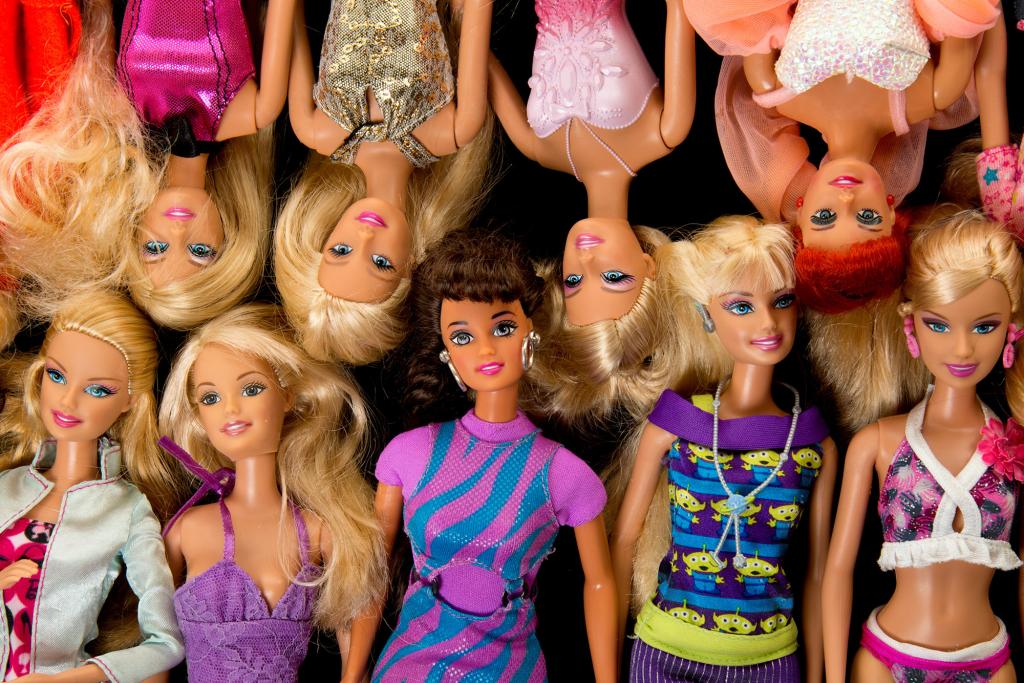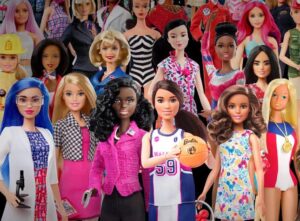
Anything is Possible!
Or Is it?
Hi Barbies!
One of this summer’s biggest hits is the film “Barbie“, directed by the talented Greta Gerwig, starring Margot Robbie and Ryan Gosling. It earned approximately 162 million dollars in its first weekend, making the movie a Barbieland of its own. It is a beautiful, satirical film with tons of irony. It contrasts in situations within the Barbie world, where women can do anything and everything, and in the real world, where they are treated differently. The essence of the movie is the depiction of the societal norms in the Barbie world, and how they are exactly opposite to the ones of the real world, which Barbie doesn’t approve of. How two opposites of society- Patriarchy and matriarchy are expressed makes us think and wonder about our societal norms and where we stand with them. In the magnificent Barbie world, all the women are over-achievers and independent individuals who don’t need the approval of men to be great and beautiful. All they need is a little confidence and support, opportunities from society, and apt recognition for their talent. Usually, women are looked at and expected to be perfect and have multiple skills. America Ferrera’s eye-opening monologue gained a different fan base and gave out the message of the authentic portrayal of women in the real world.
When women perceive themselves as “feminists,” they are often judged and criticised for playing the victim and reaping unnecessary benefits. When women support feminism, they ask for cerebral opportunities and not the putting down of men. This is the fundamental and only difference between fake and pseudo-feminism. In the real world, all the Barbies and Kens are surrounded by the toxicity of both genders and trapped in the biases which society sets for them. It is a common societal expectation that men should be good dancers, while women are often criticised for not being skilled in this area. Men who take on household responsibilities are sometimes viewed as less masculine, while women who cannot fulfil these duties are often labelled as “useless.”
Additionally, men are often praised for their success as CEOs while not being expected to contribute to domestic duties. At the same time, women are frequently questioned about their ability to balance both work and household responsibilities. Both genders experience feelings; why are men ashamed to express them and women labelled as weak or emotional when they do? Changing our pre-formed notions about gender and embracing its flaws and features will help us live better.
This Barbie fought for the dreams of young girls.
During the latter half of the film, when Barbie and Ken discover the absolute truth of the world and the other extreme- Patriarchy, they try to understand and unfold this newfound mystery. Ken realises being muscular and having a beach body is not enough to survive and decides to learn about the new world and brings changes in the Barbie world. On the other hand, Barbie realises the false standard the doll had set for women, which questions the toy makers. Gloria, along with her daughter and Barbie, embarked on a journey to visit Barbie’s world to fulfil Gloria’s long-lost dreams of a perfectly pink world that she’d wanted as a child. The changes that take place hence in the Barbie world shook them and the audience alike. These changes bring together all the previously influenced Barbies to regain their position (now inhabited purely by the kens, turned into a “Kendom”). In this “Kingdom,” women were low-maintenance casual girlfriends who did nothing but run behind their kens for their service day and night. Once they formulate a plan and get the Barbie world back, Barbie explains to Ken that he doesn’t need a Barbie to be himself but to be his person, indicating that men and women are not dependent on each other but complement each other so well it makes the world a much beautiful place.
I’m Just Ken
Hi Kens!
The Barbie movie, following its feminist themes, has also taught an important lesson to all the world’s young men today. Yes, you know who I am talking about. Can you feel the Kenergy? Ken plays a pivotal role in the movie. Initially, the Kens of Barbie-world had no real purpose other than “Beach .” Their existence had meaning only when their respective Barbies noticed them. They were human accessories. Greta Gerwig very skillfully tries to flip the traditional gender roles in the film to show that any gender can be subject to oppression. She shows that gender does not create oppression; instead, it is the traditional idea of gender roles and whoever enforces it that creates pressure and division. Ken never gets to hang out with Barbie because it’s always girls’ night. This leaves him feeling lonely and more competitive towards other Kens as they all continue fighting for the one thing that defines them – the attention of Barbie. After Ken goes to the real world and learns about Patriarchy, he tries to implement the same in Barbie-world. In his quest for attention and affection, Ken fails to see the flaws in Patriarchy. In the new Patriarchy driven- “Barbie World,” the Kens must keep proving their worth to their Barbies. They fear that their Barbies will leave them for another Ken if they do not prove their worth every second of the day. This insecurity is what leads to their downfall. The Barbies take a decisive move to swap their Kens and make them jealous. This leads to a spectacular war of the Kens, full of 90s-style dancing and manic energy. At the end of it, the Kens learn that each one wants the same thing – kindness and affection. So they decide to end Patriarchy with one big manly hug and learn to work and respect each other.
Fight each other, or fight for each other?
However, they believe their worth lies only in being with their Barbies. Ryan Gosling’s Ken says, “It’s Barbie and Ken; there is no Just Ken.” Margot Robbie’s Barbie then aptly says, “It’s Barbie, and it’s Ken.” Ken realises he is separate from Barbie and needs to learn who he is without her. Ken now has the freedom to discover who he is, what he is good at, and his purpose in life. In this era of hook-ups and putting all your status on who you are dating, it is essential to learn who YOU are before you can get to know someone else. The Kens truly set themselves free when they realise they are Kenough. This teaches young boys worldwide a fundamental lesson: no matter what anybody says, you don’t need to prove yourself to anyone because you are always “Kenough.”
In the original Barbie world, the ideals of being perfect all the time put immense strain on stereotypical Barbie as her thoughts of death, flat feet, and cellulite are not considered excellent, according to the other Barbies. The Kingdom exhibited many such flaws too. The need to constantly prove yourself, placing your self-worth in your relationships, and hyper-competitiveness puts tremendous pressure on the Kens, one of whom initially thought Patriarchy was all about Horses.

Toxic masculinity refers to societal norms promoting the idea that being a man should be equated with being dominant, aggressive, emotionally repressed, and unyielding. Men who conform to toxic masculinity often suppress emotions, view vulnerability as a sign of weakness, and assert dominance over others to validate their masculinity. This harmful ideology perpetuates a damaging definition of manhood, limiting men’s ability to embrace their full emotional range, establish meaningful connections, and express themselves authentically. On the other hand, toxic femininity involves strictly adhering to societal norms that portray women as passive, submissive, and emotionally dependent on others. Women who internalise these toxic expectations may feel compelled to suppress their ambitions and seek validation solely through their appearance or relationships. Toxic femininity can lead to codependent relationships, feelings of inadequacy, and a lack of self-fulfilment. By reinforcing the idea that women should prioritise others’ needs over their own, one hinders progress toward gender equality and women’s empowerment.
Toxic masculinity and femininity are detrimental constructs that limit the potential for personal growth, emotional expression, and authentic connections. By challenging harmful gender norms and embracing a more diverse understanding of gender, we can create a society that celebrates the uniqueness of every individual and fosters healthy relationships and communities.
Fashion has always been a dynamic reflection of society, constantly evolving and adapting to the changing cultural landscape. One such trend that has taken the fashion world by storm is Barbiecore. Barbiecore is a fashion and lifestyle trend that draws inspiration from the quintessential Barbie doll and all things pink. This aesthetic movement combines elements that embody femininity, joy, and unapologetic self-expression. The color pink has a long and complex history in fashion. Traditionally associated with femininity and sweetness, pink has faced criticism for perpetuating gender stereotypes and limiting women’s roles. Barbiecore enthusiasts embrace pink to challenge the notion that femininity equals weakness. By wearing pink proudly, individuals are subverting societal expectations and sending a powerful message about embracing all aspects of femininity, including strength and assertiveness. Bold and playful makeup that incorporates pink is commonly embraced, reinforcing the idea that makeup is not solely for conforming to societal standards but rather a form of personal artistry.
The reclaiming of pink by men is a powerful statement about the evolution of masculinity. Traditionally, masculinity has been associated with strength, stoicism, and conforming to rigid stereotypes. By embracing pink, men are challenging these norms, breaking free from the confines of traditional masculinity, and adopting a more fluid, open, and diverse expression of manhood. This shift is crucial in dismantling toxic masculinity. By defying expectations and embracing pink, men demonstrate that expressing vulnerability, sensitivity, and emotions are not signs of weakness but a display of strength and authenticity. Men reclaiming pink challenges the notion that specific colours have inherent gender attributes.
Barbiecore’s resurgence in fashion marks a cultural shift towards celebrating individuality, self-expression, and empowerment.
So cry your tears, Barbies and Kens (or Allan and Midge – we don’t discriminate) – of happiness, sadness or frustration. Embrace yourself for everything you are, in a world where we tend to define ourselves on the basis of what we lack; Only when individuals embrace their unique values and opinions and are not pressured to conform to society’s hypocritical standards, The Real World can truly become the best place to be.
Written by Mayuri Sapre and Kenneth Stephen Dsa for MTTN
Edited by Tarini Sai Padmanabhuni for MTTN
Featured Image by NYPost
Images by NFT Evening, HocMarketing, Softonic and Facebook



Leave a Reply
You must be logged in to post a comment.